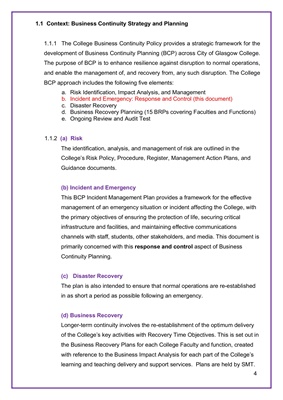
4
1.1 Context: Business Continuity Strategy and Planning
1.1.1 The College Business Continuity Policy provides a strategic framework for the
development of Business Continuity Planning (BCP) across City of Glasgow College.
The purpose of BCP is to enhance resilience against disruption to normal operations,
and enable the management of, and recovery from, any such disruption. The College
BCP approach includes the following five elements:
a. Risk Identification, Impact Analysis, and Management
b. Incident and Emergency: Response and Control (this document)
c. Disaster Recovery
d. Business Recovery Planning (15 BRPs covering Faculties and Functions)
e. Ongoing Review and Audit Test
1.1.2 (a) Risk
The identification, analysis, and management of risk are outlined in the
College's Risk Policy, Procedure, Register, Management Action Plans, and
Guidance documents.
(b) Incident and Emergency
This BCP Incident Management Plan provides a framework for the effective
management of an emergency situation or incident affecting the College, with
the primary objectives of ensuring the protection of life, securing critical
infrastructure and facilities, and maintaining effective communications
channels with staff, students, other stakeholders, and media. This document is
primarily concerned with this response and control aspect of Business
Continuity Planning.
(c) Disaster Recovery
The plan is also intended to ensure that normal operations are re-established
in as short a period as possible following an emergency.
(d) Business Recovery
Longer-term continuity involves the re-establishment of the optimum delivery
of the College's key activities with Recovery Time Objectives. This is set out in
the Business Recovery Plans for each College Faculty and function, created
with reference to the Business Impact Analysis for each part of the College's
learning and teaching delivery and support services. Plans are held by SMT.